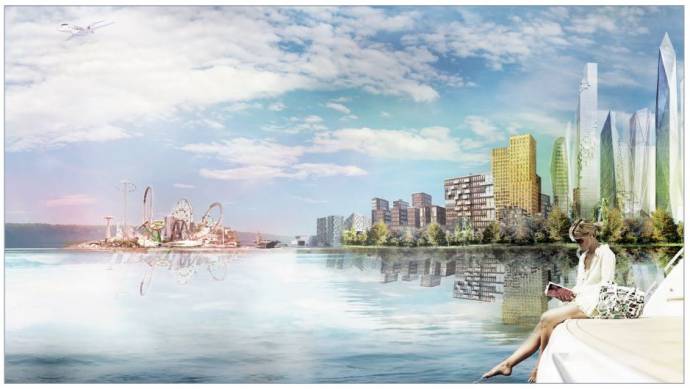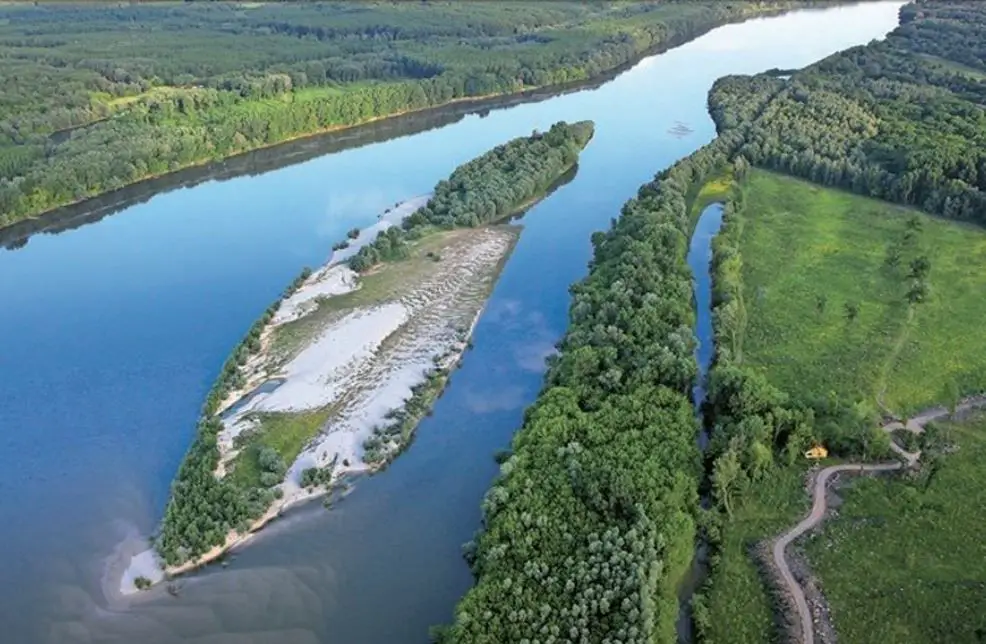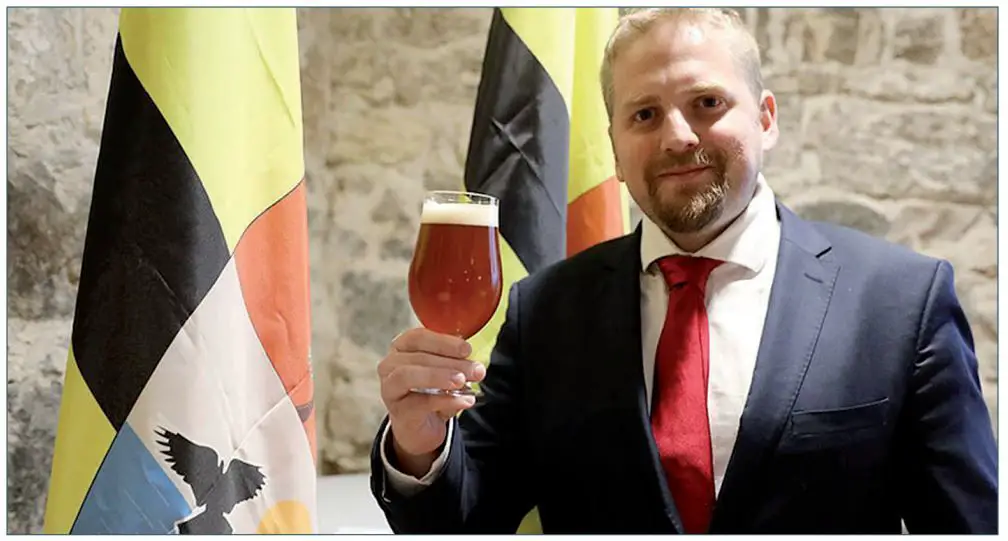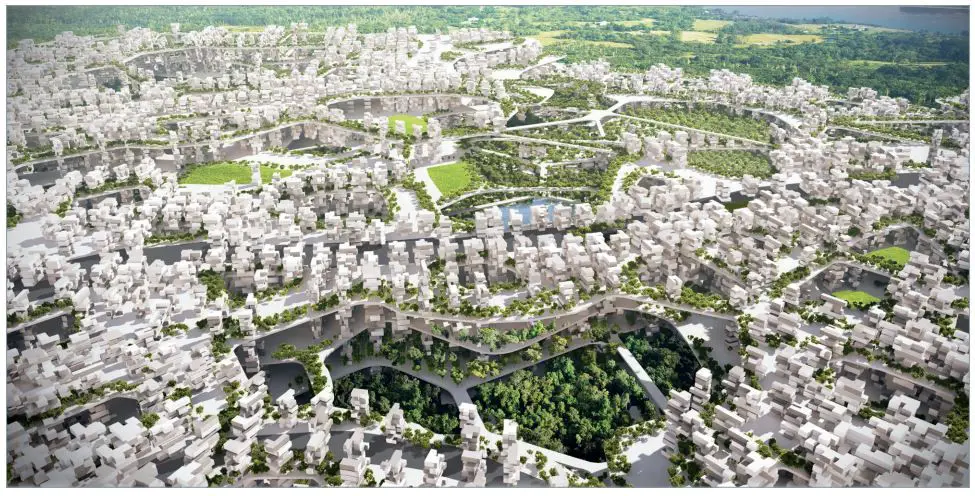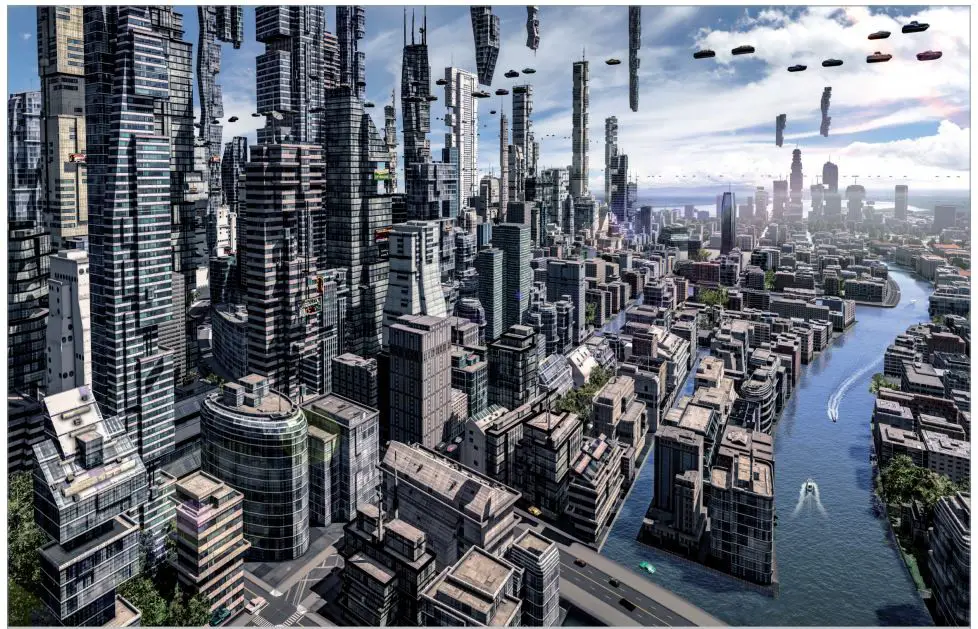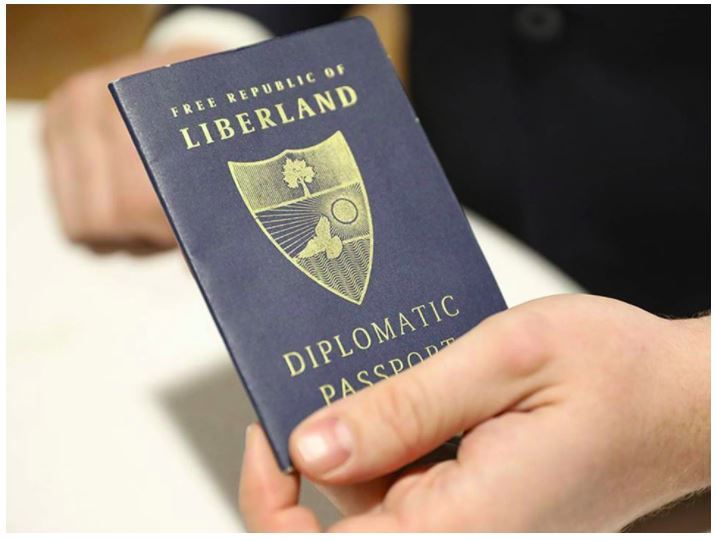February 17, 2018
Last week saw an event at the Chamber of Commerce in Ljubljana promoting Liberland and cryptocurrency, with three presentations followed by a short Q&A, and all attendees given some e-Gulden. For those not versed in the twin worlds of micronations and cryptocurrencies it was a crash course in alternative systems and brave new worlds.
Liberland from the air. Source: Liberland brochure
The first speaker was Denis Pirc, a Slovene national who is also Liberland’s Minister of Interior. His presentation was brief overview of the history of Liberland, its achievements to date and current goals, as also outlined in a brochure you can find in PDF form here. For those unfamiliar with Liberland, this is micronation that exists in a state of limbo on unclaimed land between Croatia and Serbia, an as-yet undeveloped property that aims to be a new model city-state for the 21st century, much as cryptocurrencies are seen by many as model to replace the fiat money issued by states.
Mr Pirc, whose presentation, in Slovene, can be seen here, acknowledged the high aims of the project, but also quoted Buckminster Fuller: “You never change things by fighting against the existing reality. To change something, build a new model that makes the old model obsolete.” Fuller was not the only iconoclast raised in the discussion, as Pirc also noted Frank Zappa’s observation that "You can't be a real country unless you have a beer and an airline. It helps if you have some kind of a football team, or some nuclear weapons, but at the very least you need a beer." To this end, he noted, Liberland already has two beers, a wine, and a Cesna light aircraft, ample evidence of the seriousness of this endeavor, and, in your correspondent’s opinion, achieved in the appropriate order of priority.
President Vit Jedlicka with a glass of Liberbeer. Source: Liberland brochure
The architectural aims of Liberland are perhaps even more ambitious than the geo-political ones, with the results of a design competition envisioning a transformation that would out-Dubai Dubai, with the winning proposal showing a layered metropolis, while the runner-up has skyscrapers and flying cars (which, thanks to Slovenia's Pipistrel, could soon be a reality).
A layered city. The winning entry in the Liberland architecture competition. Source: Liberland brochure
The runner-up in the Liberland architecture competition. Source: Liberland brochure
Of course, astute Slovenes and watchers of the local scene may find something familiar in Liberland, which has some affinity with Neue Slowenische Kunst’s (NSK’s) State in Time project. This has been a work-in-progress since 1992, developed by the the art groups Irwin, Laibach, the Noordung Cosmokinetic Cabinet (born of the Scipion Nasice Sisters Theatre), New Collectivism and the Department of Pure and Applied Philosophy. The State in Time project has already set up temporary embassies in foreign capitals and issued passports to its citizens, who make up a global community based not on territorial or economic principles, but on aesthetics and cognitive ones. In this regard it has some notable similarities and differences with Liberland, which at times can see like a high art prank, others like a utopian cult, and still others like a rational response to the problems of scale that can overcome larger states which are unresponsive to the needs of their citizens. In essence, however, and as far as I can tell, Liberland is as much as state of mind as a state in space.
The second presentation was by Yoshi Livo, on the topic of cryptocurrencies and e-Gulden in particular. Yoshi – not his real name – is an interesting character. Originally from the Netherlands he now sees himself as from Liberland, and travels the world for pleasure and tax purposes, a lifestyle funded by cryptocurrency investments. No newcomer to the scene nor unaware of the pitfalls, having been burned by the Mt Gox hack in 2014, he remains wildly enthusiastic about Liberland and blockchain, with both joined by the idea of circumventing and eventually overthrowing the current order of nation states and fiat currency. To sweeten the pot, at the end of the event Yoshi handed out Liberland stickers and paper wallets that include e-Gulden, his favoured cyptocurrency, with one sitting on my desk as I type this, perhaps my gulden ticket to the moon.
The last speaker was Martim Ventosa, from Portugal, who spoke on the topic of goDruid. As the website puts it, “goDruid is a consumer driven solution that will put the onus of saving the planet on the consumer, not the government. How do we save the health of our common home? By marrying the Blockchain with the Earthship.” Mr Ventosa had given a presentation on the same subject and in the same city not long before, as shown below.
Like Liberland, goDruid is a project that aims high, one that calls for the development of large-scale sustainable living structures that are both able to meet the environmental standards and flexibility needed to combat and live with climate change, while following a path of extreme independence. As such, this presentation fit in well with the general theme of libertarian techno-utopianism that took over room in Ljubljana Chamber of Commerce.
Source: Liberland brochure
After the event I read the Liberland promotional material (PDF here) in more detail. This shows a project with an interest in city-states, like Singapore, Hong Kong and Monaco, with the latter seeming to have special appeal, due to its low tax status, ultra-free market ethos and population of the rich and / or beautiful. Moreover, the fact that Monaco’s a principality, and both Hong Kong and Singapore de facto one-party states, is not seen as an impediment to liberty in this context – with the argument being that democracy isn’t needed if people can vote with their feet (although it should be noted that Liberland bills itself as a “constitutional republic with elements of direct democracy”). It’s a bold vision, and perhaps a tough sell within the EU, although Liberland itself does not intended to join the Union, while still hoping for freedom of movement across its borders, perhaps negotiating a deal similar to the one Switzerland enjoys.
It’s a heady vision, but one that has obvious appeal to certain constituencies, and the brochure cheerfully plots a future with various Free Private Cities popping up around the globe, tax havens that, their proponents claim, will have spill-over benefits for their neighbouring states. That said, at present Croatia remains opposed to the development of techno-utopia on it’s doorstep, with police making Liberland a virtual no-go area. Moreover, since the territory currently has very little physical infrastructure, immediate plans for the project tend to focus on the use of the Danube as international waters, with settlers expected to live on houseboats that make use of solar power and hydrogen fuel cells.
Those curious to learn more about these developments and catch a glimpse of Liberland itself could thus do worse than booking a ticket to the upcoming d10e conference on decentralisation, April 12–15 2018, to be held on a boat beside the territory, and aimed at “exploring the future of fintech, ICOs, blockchain, the sharing economy, future of work and disruptive culture.”
You could also apply for Liberland citizenship or download the Liberland app, which, as per the site, “allows Liberland E-residents to fully enjoy benefits of global free market. Combining the features of Uber, Fiver, Airbnb and eBay anybody can offer their service based on their GPS location or address free of charge anywhere in the world. Full integration with Facebook and LinkedIn and support of bitcoin makes it very easy to start doing business in free Liberland legal environment. Liberland E-residents build up their reputation by paying voluntary taxes to Liberland. They get Liberland merits in return which they can later exchange for full Liberland citizenship.”
Overall, Liberland is hugely ambitious, the successful realisation of which would have profound implications for the future of nation states, and while many of the aims may seem pie in the sky to those who haven’t committed to the project and its goals which, to be clear, are radically anarcho-capitalist in nature, stranger things have happened. And since we live in an age when billionaires own private rocket ships and plan to retire on Mars, perhaps President Jedlicka deserves more attention.
Liberland is marked as Siga Island on the map

